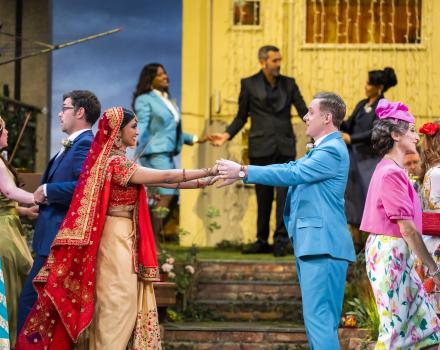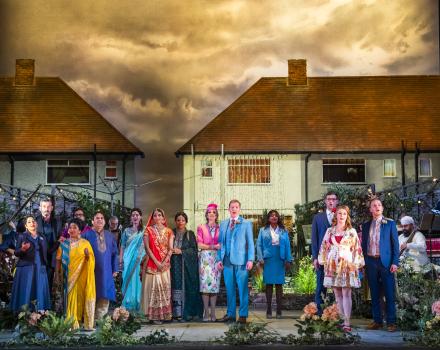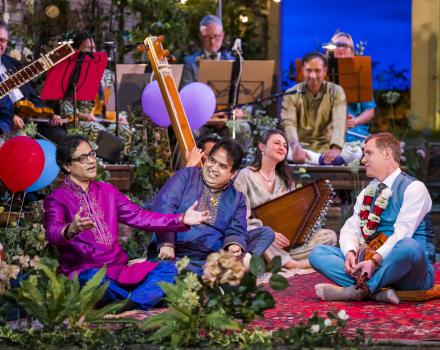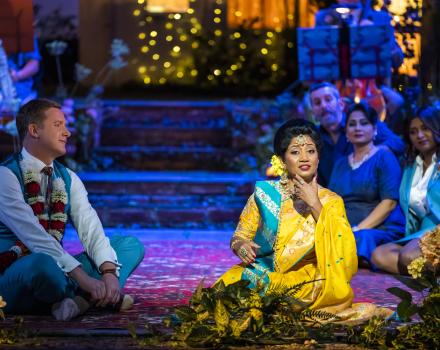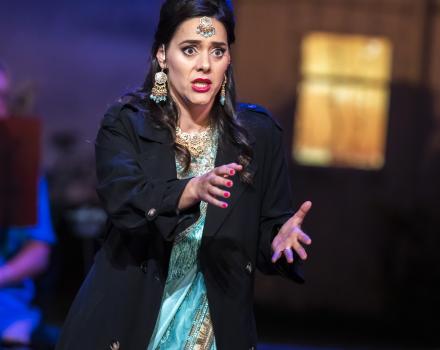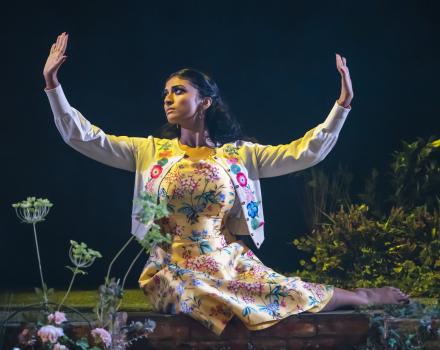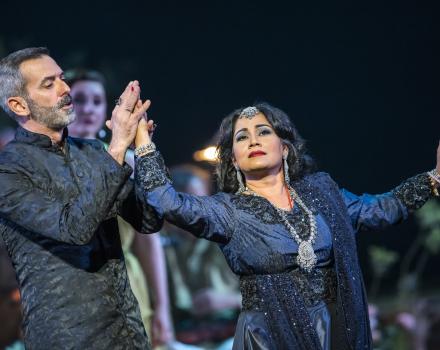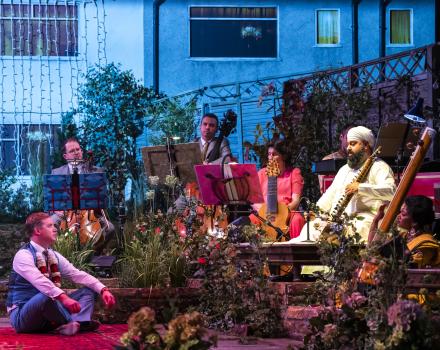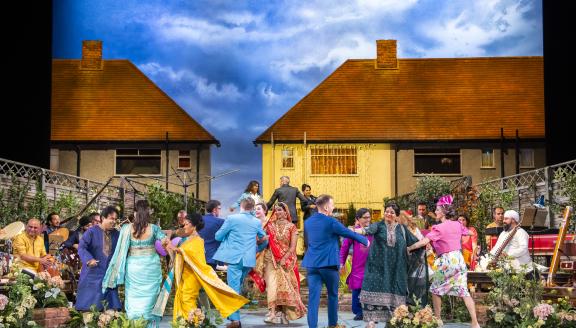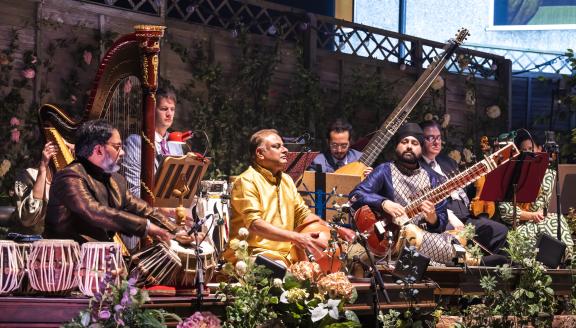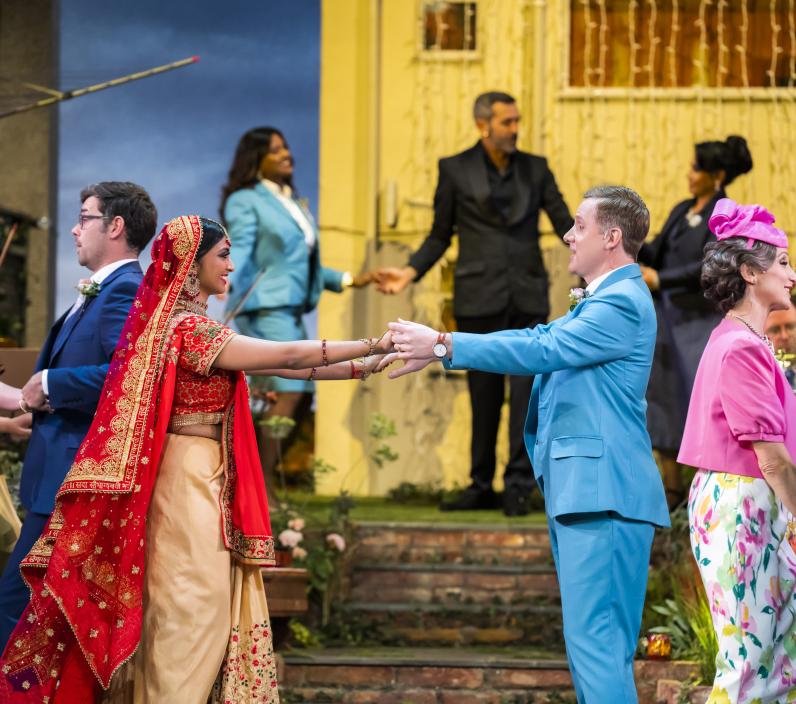

Orpheus

The wedding of the year is here as Orpheus, the musician of mythical power, marries graceful Eurydice. When the newlyweds’ joy is shattered by the sudden death of Eurydice, our heartbroken hero sets off on a mission to the underworld to rescue his bride, certain that his love will overcome adversity. Can Orpheus conquer fate, or will his heart be broken for a second time?
Opera North’s adventurous new production of an ancient tragedy is told through a meeting of the worlds of Indian and western baroque classical music. The bowed strings of the violin and the tar shehnai, the hammered strings of the santoor, the plucked strings of the harpsichord and sitar, and the rhythms of the tabla shape a unique musical encounter. Laurence Cummings, who also conducted Garsington’s Orfeo, is here joined by Jasdeep Singh Degun as co-music director to weave together their respective traditions of Indian classical and western early music. An onstage orchestra of 19 players includes a baroque ensemble of violin, viola, cello, bass, trumpet, percussion, harp, harpsichord, lirone and theorbo, as well as Indian classical instruments including sitar, tabla, santoor, esraj and bansuri. The cast includes performers trained in western and Indian classical traditions, with tenor Nicholas Watts singing Orpheus and British-Tamil Carnatic singer Ashnaa Sasikaran singing Eurydice. In this meeting of East and West, OperaVision closes a month dedicated to opera’s ongoing fascination with the myth of Orpheus.
Cast
|
Sangeet / Music
|
Deepa Nair Rasiya
|
|---|---|
|
La Musica / Music
|
Amy Freston
|
|
Orpheus
|
Nicholas Watts
|
|
Eurydice
|
Ashnaa Sasikaran
|
|
The Messenger
|
Kezia Bienek
|
|
Caronte
|
Kaviraj Singh
|
|
Nambikkai / Hope
|
Yarlinie Thanabalasingam
|
|
Proserpina
|
Chandra Chakraborty
|
|
Plutone
|
Dean Robinson
|
|
Apollo
|
Kirpal Singh Panesar
|
|
Apsarā / Nymph
|
Sanchita Pal
Claire Lees
Frances Gregory
|
|
Charavaaho / Shepherd
|
Xavier Hetherington
Chiranjeeb Chakraborty
Vijay Rajput
Laurence Cummings
Simon Grange
|
| ... | |
|
Music
|
Claudio Monteverdi
Jasdeep Singh Degun
|
|---|---|
|
Text
|
Based on the libretto by Alessandro Striggio
|
|
Music Director & Harpsichord
|
Laurence Cummings
|
|
Music Director & Sitar
|
Jasdeep Singh Degun
|
|
Assistant Conductor & Harpsichord
|
Ashok Gupta
|
|
Musical arrangements of ‘Aapki Khushi’ & ‘Orfaio aur Yooridees’ and Part 2 Finale
|
Ashok Gupta
|
|
Indian music and artistic consultant
|
Ustad Dharambir Singh MBE
|
|
Director
|
Anna Himali Howard
|
|
Sets and costumes
|
Leslie Travers
|
|
Lighting
|
Jackie Shemesh
|
|
Choreography
|
Urja Desai Thakore
|
|
Sound
|
Camilo Tirado
|
|
Associate director
|
Simone Ibbett-Brown
|
|
Film director
|
Alex Ramseyer-Bache
|
|
Live sound
|
Steve Hawkins
|
|
Sound mix
|
Joe Osborne
|
| ... | |
Opera North, in collaboration with South Asian Arts-uk.
Video
Story
Prologue
We gather in a local garden. Two goddesses of music invite you to join us in honouring the marriage of Eurydice and Orpheus.
Act I
The couple, their family, and their friends sing and play music of love, praise and celebration. Orpheus and Eurydice go to the temple to offer prayers while the festivities continue.
Act II
The sun dawns on a mehfil, a gathering place for entertainment. Having celebrated through the night, Orpheus and his friends continue to make music together, singing of the beauty of nature and his future with his wife. But the celebrations are ended by the arrival of Sylvia. She bears news of Eurydice’s death. Orpheus is overcome with grief and, refusing to accept that Eurydice is gone, he resolves to bring her back.
Act III
Orpheus journeys to the Land of the Dead. Nambikkai (Hope) leads Orpheus through this strange place that almost looks like home, filled with gods and spirits with the faces of his family and friends. At the boundary between life and beyond, he sings to the boatman Caronte (“Possente spirto, e formidabil nume” – Powerful spirit, formidable god), who pities him but does not let him cross. Eventually, lulled by Orpheus’ music, Caronte falls into a deep sleep, allowing Orpheus to travel on through the other world.
Act IV
Proserpina, Queen of the Land of the Dead, has overheard Orpheus’ plea. She asks her husband Pluto to allow him to return home with Eurydice. Pluto agrees on the condition that Orpheus leads her back to the world of the living without once looking back. As they journey home, Orpheus begins to doubt that Eurydice is behind him and can’t help but turn back to check.
Act V
Orpheus opens his eyes. He is back at home and Eurydice is still gone. But Orpheus is forever changed by what he has seen of the other world and, through the rift, the guru-god Apollo returns to light his way through this time of great loss and change.
Gallery
